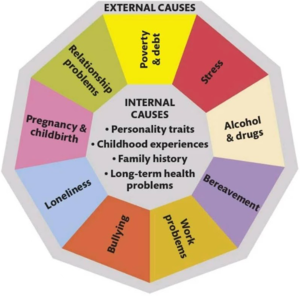Mental Illness
Mental illness is a funny term. It is contextual to the time that we are in. For instance, did you know that Homosexuality was classified as a mental disorder in the Diagnostic and Statistical Manual of Mental Disorders (DSM) beginning with the first edition, published in 1952 by the American Psychiatric Association (APA)? It makes you think about the term mental illness and where it came from...
Psychiatry
Psychiatry, historically consisted of specialist doctors observing patients and producing a diagnosis based upon their contextual observations. However, in the 1970's this came under fire in part due to R. D. Laing and a series of experiments, one of which was the Thud experiment.
Thud Experiment
This psychological experiment saw psychologist David Rosenhan send 10 normal people as shills to be committed into mental institutions across the US. Rosenhan asked only one thing of those that were to be committed, to tell the psychiatrists that they kept on hearing the word "thud" in their head. Apart from this, the shills were told to act completely normally. Each participant was subsequently diagnosed insane and committed indefinitely to the mental institution. After the rouse was up, the shills thought that they would simply tell the psychiatrist it was just a game and they would simply be allowed go home, however, this was not the case. On average the shills were committed for 2 months and were only let go when they accepted to the doctor that they were mad and were getting better.
This and other founded criticisms concerning historical misdiagnosis rates[1][2][3] led to the restructuring of psychiatry as a science, away from the subjective analysis of bias prone practitioners to more objective psychometric tests. By using a yes / no algorithm based upon reported symptoms it was found that 50% of all US citizens had a mental disorder. This was an issue, and the pharmaceutical corporations diligently invented an answer releasing the first ever antidepressant, fluoxetine in 1988. Prozac as it was called, rapidly became the most widely prescribed drugs in history. In fact, in Australia, 1 in 7 now take one antidepressant daily.
Endogenous vs Exogenous Depression
Given these numbers, its seems there is a huge mental health pandemic globally. However, if you look closer...by relying on psychometric tests to diagnose depression psychiatrists fail to account for a patients context. For instance, the patient might be recently bereaved or had just lost their job, the normal ups and downs in life (See Figure 1). These external effects are called exogenous and by using purely behavioural psychometric test that are mixed in with more biological endogenous, disorders. This has created an illusion of a vast mental health epidemic.
References
- ↑ Beyond Misdiagnosis, Misunderstanding and Mistrust: Relevance of the Historical Perspective in the Medical and Mental Health Treatment of People of Color. Derek H. Suite, MD, MS; Robert La Bril, MDiv; Annelle Primm, MD, MPH; and Phyllis Harrison-Ross, MD. Accessed on 30 November 2022 via https://www.ncbi.nlm.nih.gov/pmc/articles/PMC2574307/pdf/jnma00207-0025.pdf
- ↑ Analysis of Misdiagnosis of Bipolar Disorder in An Outpatient Setting. Shen H, Zhang L, Xu C, Zhu J, Chen M, Fang Y. Shanghai Arch Psychiatry. 2018 Apr 25;30(2):93-101. doi: 10.11919/j.issn.1002-0829.217080. PMID: 29736129; PMCID: PMC5936046. Accessed on 30 November 2022 via: https://www.ncbi.nlm.nih.gov/pmc/articles/PMC5936046/
- ↑ Rates of Detection of Mood and Anxiety Disorders in Primary Care: A Descriptive, Cross-Sectional Study Monica Vermani, PsyD, Madalyn Marcus, MA. Prim Care Companion CNS Disord. 2011; 13(2): PCC.10m01013. doi: 10.4088/PCC.10m01013. Accessed on 30th November 2022 via https://www.ncbi.nlm.nih.gov/pmc/articles/PMC3184591/
